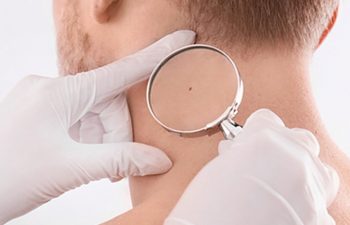
Is a Spot on My Skin Suspicious?
There are so many things to worry about that sometimes it is hard to prioritize where to put the most energy. Financial strains, political upheaval, and relationship problems can all cause stress in our lives. However, the area that needs the most priority in life is your health.
Your skin is the largest organ of your body, and the health of your skin plays a huge role in your overall health. Skin cancer is a serious medical diagnosis that can pose serious health risks, even death, if not treated early. Skin cancer screening appointments can help detect both benign and malignant spots on the skin.
If you have never had a skin screening done, now is the time. People who are at risk for hereditary factors (i.e., family members who have been diagnosed with skin cancer) should make it a priority to see the dermatologist for annual skin cancer screening. Skin cancer sufferers have one of the highest survival rates when the cancer is detected early.
The “ABCDE’s” of Suspicion
Many people look at spots on their skin and wonder if they are suspicious. How do you know if a mole or a freckle is concerning, especially if it has been there for a long time?
Dermatologists have an “ABCDE” method to help people identify suspicious spots on their skin. If any of the following symptoms apply to a spot on your skin, you should see a doctor immediately:
A. Asymmetrical: Healthy moles are symmetrical. That means you can draw a line down the middle of a mole, and both sides will look very similar. Cancerous moles are asymmetrical, meaning that one side looks very different from the other.
B. Border: Healthy moles should have a smooth, even border. Raised, ragged, or notched edges of a mole can be a sign of cancer.
C. Change in color: Healthy moles are uniform in color. If there is color variation, it may be caused by cancer. Be on the lookout for different shades of tan, brown, red, blue, black, or white.
D. Diameter: If you have a spot on your skin that is larger than 6 millimeters in diameter, you need to have it looked at. The larger the spot, the greater the chance that something is abnormal.
E. Evolving: Once you reach adulthood, new spots should not come to the skin. If you have new moles, freckles, or raised spots develop on your skin, you should immediately make an appointment with your dermatologist.
At Spectrum Dermatology of Atlanta, we are the skincare experts you can trust. We are dedicated to providing our patients with thorough and compassionate skincare. Contact us today to schedule an appointment.
Posted on behalf of
1725 Windward Concourse, Suite 120
Alpharetta, GA 30005
Phone: (470) 731-8010
FAX: (470) 731-8005
Email: info@specdermatl.com
Opening Hours:
Monday - Friday 8AM - 5PM

